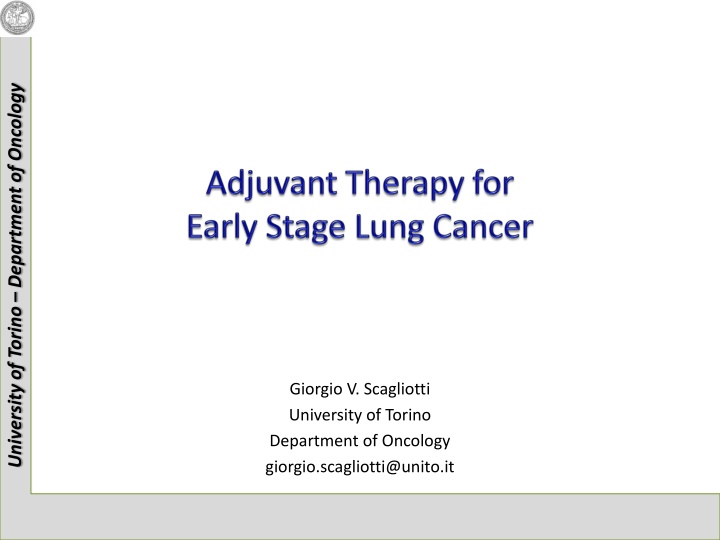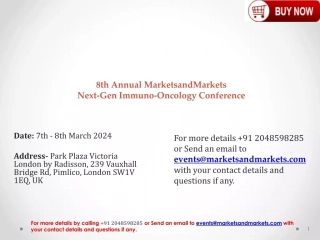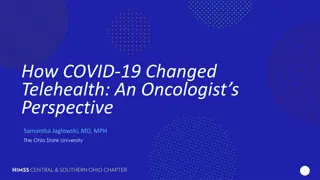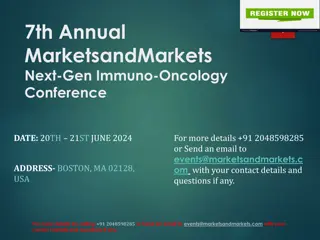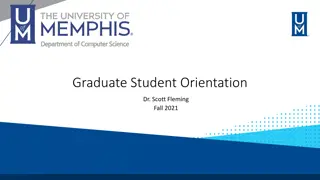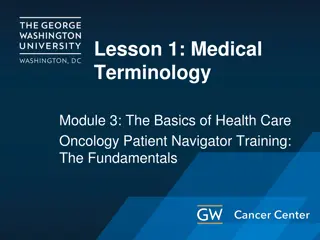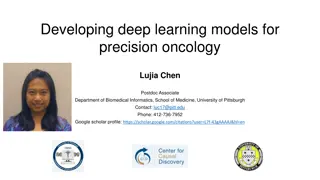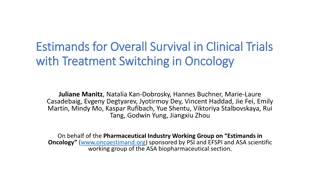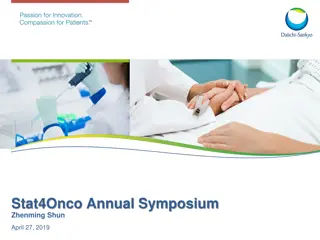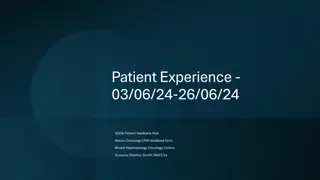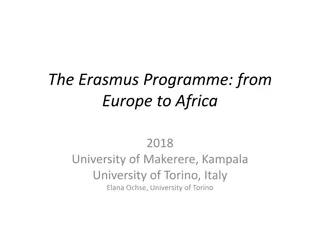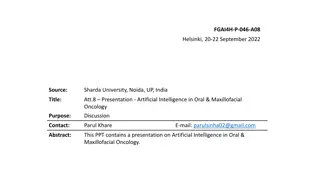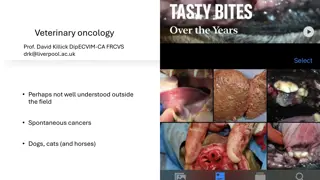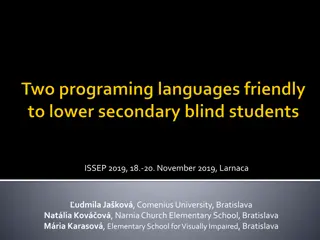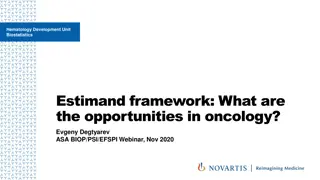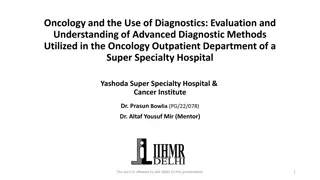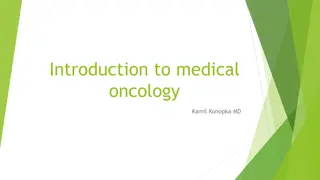University of Torino Department of Oncology Research
The University of Torino Department of Oncology is actively involved in conducting trials and research in the field of Non-Small Cell Lung Cancer (NSCLC). The department, led by Giorgio V. Scagliotti, has made significant contributions to the understanding of treatment outcomes in different stages of NSCLC. Their studies have provided insights into the efficacy of various therapies, including cisplatin-based regimens and the controversial use of carboplatin. The research also explores factors influencing treatment decisions, such as patient age and disease stage. Overall, the department's work aims to improve the standard of care for individuals with NSCLC.
Download Presentation

Please find below an Image/Link to download the presentation.
The content on the website is provided AS IS for your information and personal use only. It may not be sold, licensed, or shared on other websites without obtaining consent from the author.If you encounter any issues during the download, it is possible that the publisher has removed the file from their server.
You are allowed to download the files provided on this website for personal or commercial use, subject to the condition that they are used lawfully. All files are the property of their respective owners.
The content on the website is provided AS IS for your information and personal use only. It may not be sold, licensed, or shared on other websites without obtaining consent from the author.
E N D
Presentation Transcript
Universityof Torino Department of Oncology Giorgio V. Scagliotti University of Torino Department of Oncology giorgio.scagliotti@unito.it
Universityof Torino Department of Oncology 34 trials, 8447 patients HR 0.86 (95 CI : 0.81-0.92) P<0.0001 4% benefit 13 trials, 2660 patients HR 0.88 (95 CI : 0.81-0.97) P<0.009 4% benefit NSCLC Meta-analyses Collaborative Group Lancet 2010; 375:1267
University of Torino Department of Oncology Accepted as the standard in node-positive curatively resected early stage NSCLC Remains controversial in node-negative early stage NSCLC (decisions based on tumor size) Cisplatin-based therapy considered the standard Carboplatin often used but unproven Most evidence-based regimen - cis/vinorelbine ECOG 1505 - allowed other regimens all of which were previously untested in the phase III setting
University of Torino Department of Oncology Stages IB-pT3N1 Cis/Vb N-67 Cis/Pem N-65 Feasibility 75% 96% Early termination of therapy 63% 22% Grade 3-4 hematological toxicity 78% 11% Grade 3-4 non-hematological toxicity 33% 31% Dose Delivery (% Planned) Cis 66% Cis 90% Vb 64% Pem 90% p =.001; p<.0001 Kreuter M et al. Ann. Oncol. 24: 986 992, 2013
University of Torino Department of Oncology Booth C.M. et al. J. Clin.. Oncol. 2010; 28: 3472-3478
University of Torino Department of Oncology Decision associated to age (younger patients) and stage (II-III) Co-morbidity and post-operative length of stay not associated with initial referral but associated with the use of ACT in patients seen by medical oncologists Kankesan J. et al. Curr. Oncol. 2013; 20:30-37
University of Torino Department of Oncology Booth C.M. et al. J. Thorac. Oncol. 2012; 7:559-566
University of Torino Department of Oncology In ACT the most evidence-based regimen is cisplatin/vinorelbine Weekly schedule of vinorelbine used in some of the phase III studies was associated with low compliance and significant toxicities. Discrepancies with routine clinical practice. Carboplatin often used but unproven . Need for studies testing alternative regimens and schedules.
University of Torino Department of Oncology Phase II proof of concept studies less applicable to adjuvant setting. In adjuvant studies overall response rate is NOT an endpoint. Survival is much longer and potentially impacted by additional lines of therapy at relapse. Quality of life issues and adverse events. Early stage NSCLC are less frequently reported than in other types of tumors (e.g. breast).
University of Torino Department of Oncology Primary endpoint Disease free survival vs. Overall survival? Cross over effect Disease free survival- 2 years? 3 years? Event free survival
University of Torino Department of Oncology Predictive Factors P r b a b i l i t y patients with residual micrometastases sensitive to adjuvant therapy Prognostic Factors Survival Time
University of Torino Department of Oncology Better risk stratification to guide selection of neo-adjuvant & adjuvant therapy Develop novel options for high-risk patients Tailoring chemotherapy based on individual molecular markers ERCC1, BRCA1, RRM1, TS, genomic alterations Integration of targeted agents
University of Torino Department of Oncology Kratz J.R. et al. Lancet 2012; 379:823
University of Torino Department of Oncology Kaiser validation cohort N= 420 Chinese validation cohort N=471 Kratz J.R. et al. Lancet 2012; 379:823
University of Torino Department of Oncology 4 cycles cisplatin + vinorelbine Routine CT scans DFS OS Chemotherapy N=350 Randomization N=700 PervenioTMLung RS Testing Observation N=350 High Risk N~750 Routine CT scans DFS OS Screening: R0 resection Non-squamous NSCLC Pathologic stage I N = 1,500 Excluded Intermediate Risk N~375 Low Risk N~375 Observed for OS N=350
University of Torino Department of Oncology Reference Marker Trial N Marker HR for Survival (P Value) Fouret 2009[1] MSH2 IALT 768 Negative Positive 0.76 (.03) 1.12 (.48) Olaussen 2006[2] ERCC1 IALT 761 Negative Positive 0.65 (.002) 1.14 (.40) Filipits 2007[3] p27Kip1 IALT 778 Negative Positive 0.66 (.006) 1.09 (.54) Tsao 2007[4] p53 JBR.10 253 Positive Negative 0.54 (.02) 1.40 (.26) Seve 2007[5] -tubulin III JBR.10 265 Positive Negative 0.64 (.07) 1.00 Pirker 2007[6] ERCC1/p27Kip1 IALT 778 Both negative Both positive 0.52 (95% CI: 0.36-0.74) 1.27 (95% CI: 0.87-1.84) Fouret 2009[1] MSH2/ERCC1 IALT 658 Both negative Both positive 0.65 (.01) 1.30 (.19) 1. Fouret P, et al. ASCO 2009. Abstract CRA7502. 2. Olaussen KA, et al. N Engl J Med. 2006;355:983-991. 3. Filipits M, et al. J Clin Oncol. 2007;25:2735-2740. 4. Tsao MS, et al. J Clin Oncol. 2007;25:5240-5247. 5. Seve P, et al. Clin Cancer Res. 2007;13:994-999. 6. Pirker R, et al. J Thoracic Oncol. 2007;2:S397-S398.
University of Torino Department of Oncology Trial Stage Biomarkers SWOG 0720 I ERCC1/RRM1 ITACA II-III ERCC1/TS SCAT II-IIIA BRCA1 MAGRIT IB-IIIA MAGE-A3 TASTE II-IIIA ERCC1/EGFR mut
University of Torino Department of Oncology Trial Stage Therapy Marker SWOG 0720 I Chemotherapy (cis/gem) ERCC1/RRM1 ITACA II-III Cisplatin/Pemetrexed ERCC1/TS SCAT II-IIIA Platinum/Docetaxel BRCA1 MAGRIT IB-IIIA MAGE A3 Vaccine MAGE-A3 TASTE II-IIIA Erlotinib vs CDDP Pem ERCC1/EGFR mut RADIANT IB-IIIA Erlotinib vs Placebo EGFR FISH or IHC+ SELECT I and I N0 Erlotinib EGFR mutation GACT II-IIIA N+ Gefitinib vs CDDP Vinorelbine EGFR mutation
University of Torino Department of Oncology Preclinical and retrospective studies initially suggested a predictive role for BRCA1 with regard to cisplatin response1-5 Phase III trial in stage IV NSCLC using BRCA1 and RAP80 expression levels showed a OS in the experimental arm compared to the control arm 6 IALT - no association between BRCA1 expression (IHC) and cisplatin response7 1. Taron M et al. Hum Mol Genet 2004;13;2443-9, 2. Papadaki C et al. J Thorac Oncol 2012;7; 663-71, 3. Rosell R et al, PLoS ONE 2009; 4. e5133, 4. Su C et al. Med Oncol 2001;28;1411-7, 5. Bartolucci R et al, Clin Lung Cancer 2009; 10;47-52, 6. Moran T et al. J Clin Oncol, 2013; 31; LBA8002, 7. Pierceall WE et al. Ann Oncol 2012; 23; 2245-52
University of Torino Department of Oncology Docetaxel/Cis CONTROL 1 Resected NSCLC R0 pN1 / pN2 Q 1 BRCA1 : Gem/Cis 3 Q 2 & 3 BRCA1 EXPERIMENTAL Docetaxel/Cis Statification factors: - Stage: N1 vs. N2 - Age <65 vs > 65 y - Histology: Non-SCC vs. SCC - Type of resection: Lobectomy vs Pneumonectomy Docetaxel Q 4 BRCA1 Planned number of patients: 432 (amended) Eudract: 2007-000067-15 NCTgov: 00478699 CT should be started before 8 weeks after surgery PORT in N2 patients
University of Torino Department of Oncology HR=0,86 (0,59-1,27) Massuti B. et al. Proc. ASCO 2015
University of Torino Department of Oncology Study hypothesis : absolute improvement of 20% in experimental group with a 80% power The study failed to show a significant benefit from treatment customization but a prolonged FU time is needed to conclude in favor of a completely negative study (current FU 28 months) The study does not support the hypothesis of cisplatin- resistance in high BRCA1 tumors and cisplatin- based CT remains the standard The study suggest a differential activity of the 2 explored doublets in low BRCA1 tumors but be careful about subgroup analyses Dose reductions? Treatment compliance in the elderly patients?
University of Torino Department of Oncology Standard Chemotherapy N= 700 R HIGH ERCC1 & HIGH TS Radically Resected II-IIIA No prior Chemotherapy or Radiation Therapy prior surgery Docetaxel Standard Chemotherapy ERCC1 and TS Assessment by RT-PCR HIGH ERCC1 & LOW TS R Pemetrexed Standard Chemotherapy Stratification Factors Pathological stage (II vs. III) Smoking status (current vs. former vs. never smoker) R LOW ERCC1 & HIGH TS Cisplatin/Gemcitabine Standard Chemotherapy R LOW ERCC1 & LOW TS Cispplatin/Pemetrexed
ITACA - Treatment allocation by profile (N=761) University of Torino Department of Oncology 160 140 PROFILE1: ERCC1 low, TS low PROFILE2: ERCC1 low, TS high PROFILE3: ERCC1 high, TS low PROFILE4: ERCC1 high, TS high 120 100 personalized 80 standard 60 40 20 0 PROFILE 1 PROFILE 2 PROFILE 3 PROFILE 4 37.5% 11.6% 24.2% 26.8% Novello S. et al. JTO suppl. Sept. 2015
ITACA -Major adverse events according to treatment (N=761) University of Torino Department of Oncology AE Personalized: n=375 Standard: n=386 p * Grade >0 3-5 >0 3-5 Anemia 18.7 1.6 25.9 1.8 .019 Neutropenia 20.8 12.8 23.6 17.4 .048 Thrombocytopeni a 12.3 3.5 17.9 7.3 .019 Nausea/Vomiting 24.0 3.5 30.8 4.1 .018 Cardiac 2.4 1.0 3.6 1.0 .406 GI 35.5 5.9 42.0 4.9 .058 Infections 12.0 1.9 11.7 2.6 .800 SAE leading to discontinuation 8.3 16.0 .002 Preliminary Results of the International Tailored Chemotherapy Adjuvant Trial: the ITACA Trial Silvia Novello
ITACA -Major Adverse Events According to Treatment Profile 1 (N= 285) University of Torino Department of Oncology AE Tailored: n=143 Control: n=142 p * Grade >0 3-5 >0 3-5 Anemia 11.9 0.7 26.8 2.1 <.001 Neutropenia 13.3 7.7 25.4 16.9 .004 Thrombocytopeni a 0.0 0.0 21.8 8.5 <.001 Nausea/Vomiting 14.0 0.0 31.7 4.9 <.001 Cardiac 0.7 0.0 5.6 0.7 .042 GI 24.5 0.7 44.4 5.6 <.001 Infections 8.4 1.4 16.2 5.6 .049 SAE leading to discontinuation * p value for difference in distribution of SAE grade by treatment 15.7 34.1 .001
University of Torino Department of Oncology EPIGENETIC ALTERATIONS OF GENES INVOLVED IN DNA REPAIR ALTERATION OF GENES INVOLVED IN DNA REPAIR
University of Torino Department of Oncology Mismatch repair Base and nucleotide excision repair Telomere maintenance Double-stand break repair De-regulated DNA replication Chromosome segregation Mutational signature reflecting the imprint of the type of DNA damage Barrell RA et al. Nature 2013; 501: 338
University of Torino Department of Oncology Cisplatin based Chemotherapy R A N D O M I Z E pStage IB-IIIA IB > 4 cm All histologies Cisplatin based Chemotherapy + Bevacizumab: 15 mg/kg followed by Bevacizumab x 1 year REGIMENS Vinorelbine + CDDP 85% power to detect a HR 0.79 (26.5% OS advantage) N=1500 Docetaxel + CDDP Gemcitabine + CDDP Pemetrexed + CDDP Wakelee, et al. J Clin Oncol 2011; 29 (suppl; abstr 7013)
ECOG 1505 Efficacy Outcomes University of Torino Department of Oncology Wakelee H. et al. JTO suppl. Sept. 2015
University of Torino Department of Oncology Can the therapeutic advances that have been made with molecularly targeted therapy and immunotherapy in metastatic disease translate to increased cures in early stage disease?
University of Torino Department of Oncology Is the alteration equally present in early disease? Is the molecular alteration stable overtime? Is the targeted treatment equally effective as adjuvant (maintenance) treatment or should be reserved at relapse? Are long term toxicities tolerable?
University of Torino Department of Oncology N Design Primary Endpoint ALCHEMIST 410 pts Stage IB(>4cm- IIIA) Erlotinib versus placebo x 2 years (after chemotherapy) Overall Survival ADAURA 700 pts Stage IB-IIIA AZD9291 versus placebo x 3 years (after chemotherapy) Disease Free survival Japan WJOG6401L 230 pts Stage II-IIIA Gefitinib x 2 years CDDP/VNR 4 cycles Disease free survival at 5 years China CTONG1104 220 pts Stage II-IIIA Gefitinib x 2 years CDDP/VNR 4 cycles Disease free survival China ICTAN 477 pts Stage II-IIIA Chemotherapy Chemotherapy followed by 6 or 12 months of icotinib Disease free survival China 300 pts Stage II-IIIA Icotinib versus placebo x 2 years (after chemotherapy) Disease free survival Dana Farber MGH 92 pts Stage I-III Afatinib 3 months versus 2 years (after chemotherapy) Disease free survival
University of Torino Department of Oncology Consent & Register: A151216 Screening & Follow-up Protocol Pre-op Cohort SOP-driven FF/FFPE After resection, buffy coat Post-op Cohort Assess FFPE buffy coat CLIA-approved LAB EGFR mutation test (sequencing) ALK rearrangement (FISH) TCGA Genomic sequencing Transcriptome Methylation E4512: Erlotinib A081105: Crizotinib Other Adjuvant Studies
University of Torino Department of Oncology Vansteenkiste JF et al, ESMO 2014
University of Torino Department of Oncology Therapeutic Lead company Antibody type Affinity/K2 Reference Anti-PDL1 Engineered IgG1 (no ADCC) Herbst et al. ASCO 2013 MPDL3280A Roche 0.4 nM Modified IgG1 (no ADCC) Stewart et al. Cancer Res 2011 MEDI-4736 AstraZeneca Not available Anti-PD1 Brahmer et al. J Clin Oncol 2010 Nivolumab Bristol-Myers Squibb IgG4 2.6 nM Patnaik et al. ASCO 2012 MK3475 Merck & Co IgG4 (humanised) 29 pM PD-L2 IgG1 Fc fusion Smothers et al. Ann Oncol 2013 AMP-224 GlaxoSmithKline Not available Pidilizumab (CT-011) Armand et al. J Clin Oncol 2013 CureTech IgG1 (humanised) Not available ADCC, antigen-dependent cell-mediated cytotoxicity
University of Torino Department of Oncology 1. Will immune checkpoint inhibition be effective in the setting of minimal residual disease in which a nonexistent or immature tumor microenvironment may exists? 2. What influence, if any, does surgical resection and adjuvant chemotherapy have on immune cells? 3. Who will benefit? a) Those with PD-L1 tumor expression b) Will benefit been seen across all stages of resectable disease?
University of Torino Department of Oncology Author N Stage PD-L1 Prognosis 269 (Greece) 33 (Greece) 131 (Yale) 11 (Yale) I-III IV I-III IV 25% 36% 37% 36% All patients PD-L1 associated with better survival Velcheti 2014 254 (adeno) 37 (adeno) 139 (squamous) 16 (squamous) I-IIIa IIIb-IV I-IIIa IIIb-IV 31% 19% 31% 31% Kowanetz 2010 ? Velcheti V et al. Lab Invest 94: 107-16, 2014; Kowanetz M et al. WCLC 2013 Abstract
University of Torino Department of Oncology Adjuvant cisplatin-based chemotherapy is the SOC in node-positive curatively resected early stage NSCLC The role of ACT in stage IA will be redefined in light of the new TNM staging system ECOG 1505 The role of adjuvant bevacizumab not proven in a phase III study Specifically designed studies in selected subgroups of patients will define the role of targeted therapies The role of immunotherapy in this specific setting remains a matter of clinical trials
